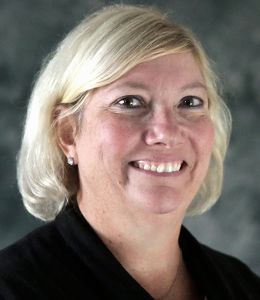Potential Careers
- Gerontology
- Pediatrics
- Mental health & psychiatry
- Physical rehabilitation
- School systems
As an occupational therapy student at Widener, expert faculty and high-quality clinical experience will prepare you for a rewarding career.
Doctorate
Hybrid (Online & On Campus)
111
3 years
Widener's doctor of occupational therapy (OTD) program consists of coursework, field experiences, and mentorship programs designed to enable students to become ethical, contemporary occupational therapy practitioners who adopt the values necessary to:
ACOTE Accreditation

The entry-level occupational therapy doctoral degree program is accredited by the Accreditation Council for Occupational Therapy Education (ACOTE) of the American Occupational Therapy Association (AOTA), located at 7501 Wisconsin Avenue, Suite 510E Bethesda, MD 20814. ACOTE’s telephone number c/o AOTA is (301) 652-AOTA and its web address is www.acoteonline.org.
Graduates of the program will be eligible to sit for the national certification examination for the occupational therapist administered by the National Board for Certification in Occupational Therapy (NBCOT). After successful completion of this exam, the individual will be an Occupational Therapist, Registered (OTR). In addition, all states require licensure in order to practice; however, state licenses are usually based on the results of the NBCOT Certification Examination. Note that a felony conviction may affect a graduate’s ability to sit for the NBCOT certification examination or attain state licensure.
The doctor of occupational therapy curriculum engages students in experiential learning, student-faculty scholarship, leadership opportunities, and service activities in Widener's culturally diverse surrounding community.
View the Loading... for information regarding the OTD curriculum.
The IOTE is predominantly a traditional weekday program. However, there are 3 courses in the curriculum that are delivered in the hybrid/online format. Success in both the online and in-person formats requires the use of Canvas, an online learning-management system. Lectures may be live using the webcasting application from multiple sources such as Zoom or Microsoft Teams. Throughout the curriculum, students may have exposure to other technology applications.
The IOTE program requires the following technology:
Hardware
Software
To practice as an occupational therapist, individuals must graduate from a university that is accredited by the Accreditation Council for Occupational Therapy Education (ACOTE), complete fieldwork requirements, and apply for and pass the National Board for Certification in Occupational Therapy (NBCOT) Certification Exam.
Students are encouraged to visit their state licensing board website for further information.
Employment of occupational therapists is projected to grow 17% by 2030, much faster than the average for all occupations.
per year (2021 median salary)
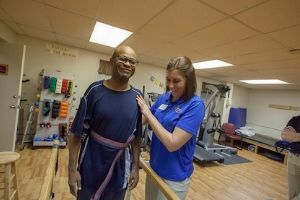
At Widener, you’ll learn from and build relationships with industry experts as they support and prepare you to serve as a leader in the occupational therapy field. Students and faculty connect interprofessionally across other departments through shared academic and experiential opportunities supporting holistic approaches to care.
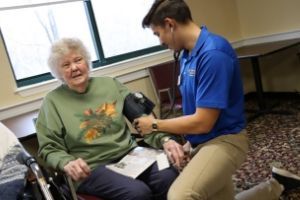
You'll experience a meaningful education with unique clinical experiences, including work with diverse and underserved local communities through the community pro bono clinic, and opportunities to participate in other Widener community-based clinics.
Occupational therapy students have the opportunity to join various clubs and organizations on and off campus to expand their network, including the Coalition of Occupational Therapy Advocates for Diversity (COTAD), and many others.
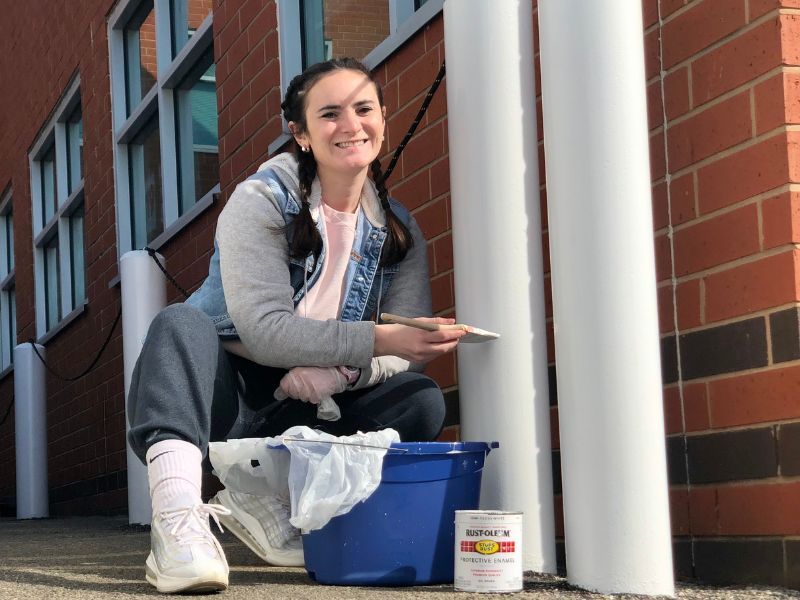
"I fell in love with exercise science and art therapy and both have been a perfect match for occupational therapy."
Being an occupational therapist provides the opportunity to make an impact on the world, from helping one individual become more independent to becoming an advocate for participation for all.
“It is the hope of the OT Program faculty to prepare students to be evidenced based and professional critical thinkers, civic minded leaders, and interprofessional practitioners. We will also lead our future graduates to work with diverse populations to help individuals and groups to best engage in their meaningful activities as independently as possible."
Future graduates will be exposed to a variety of opportunities. They will be encouraged to use their imagination, creativity, and problem-solving skills to become effective practitioners who are civically minded and evidence-based in their work.
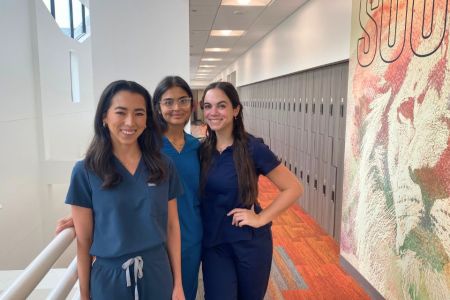
The clinical anatomy lab provides graduate health science students with hands-on access to study anatomy, master techniques and build confidence ahead of practice. In this first-person narrative, physician assistant students Sarah Connors, Jordan Li and Vrunda Patel share how the experience not only teaches them about the body, it deepens their understanding of the human experience.
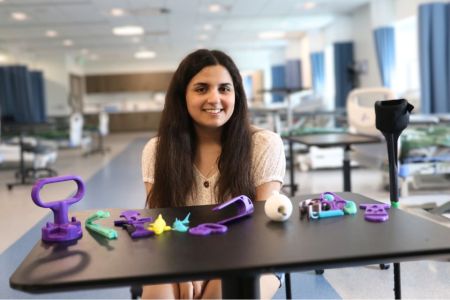
In Widener’s occupational therapy program, Lydia Aruffo '25 leveraged innovative 3D printing technology and her health science education to deliver creative, adaptable and cost-effective solutions for clients living with a rare disease.
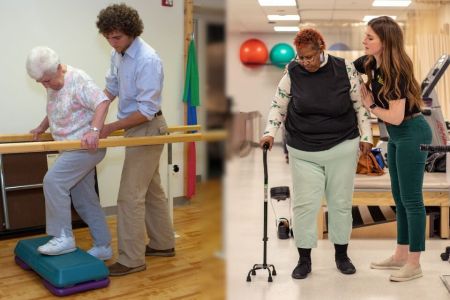
When the Chester Community Clinic first opened in September 2009 its purpose was simple: serve the community and give students an exceptional learning experience. Years of dedication to quality care and strategic transformation have established the clinic as an anchor in the community and a celebrated national model for student-led pro bono care and education.
Our admissions and financial aid teams are here to support you every step of the way. Have a question? Ask away!
Essential Functions:
Essential Functions document outlines the essential functions or skills needed of an Occupational Therapy Student.
Purpose– The purpose of this document is to assure that all students entering the Institute for Occupational Therapy Education (IOTE) know and understand the requirements and can make informed decisions as they pursue the profession. This is to clarify the essential functions that are necessary for an Occupational Therapy Student to successfully complete the didactic and clinical components of the IOTE. All Occupational Therapy Students are required to meet these essential functions. Essential functions can be successfully met by students who have documented disabilities, have requested reasonable accommodations, and are receiving reasonable accommodations. Approved accommodations in a classroom setting are not guaranteed and may not translate to the practice setting.
Widener University Institute for Occupational Therapy Education Essential Functions
Essential Functions: The OT student must be able to perform the following while preventing injury to self and their client(s):
Motor Skills: Motor components are based on the ability to demonstrate the movement and mobility skills that are required for safe handling of clients as needed to fulfill the duties of an occupational therapist.
Sensory Skills: Sensory components are based on the ability to see, hear, smell, or feel as needed to fulfill the duties of an occupational therapist.
Social Interactions and Emotional Skills: Social interactions and emotional skills are based on the ability to appropriately communicate with clients, caregivers, peers, and other professionals regardless of age, race, gender, socioeconomic, and cultural backgrounds needed to fulfill the duties of an occupational therapist.
Cognitive Skills: Cognitive skills are based on the ability to attend, recall, retain, and problem solve to fulfill the duties of an occupational therapist.
Professional Behaviors: Professional behaviors are the way in which students present themselves to others helps to define themselves as professionals.
Applicants holding a bachelor’s degree in any discipline may apply to the program under the entry-level OTD track.
Applicants are encouraged to contact the program early to assess the need for completion of prerequisite course work. Courses taken in preparation for entry may be completed at Widener University or at another university or college.
Through our pre-occupational therapy pathway, students are encouraged to apply to the professional OTD program through the OTCAS system. Students within the College of Arts and Sciences who major in anthropology, biology, art & music, psychology, or sociology will be able to take courses to meet all prerequisite requirements. Applicants must have a baccalaureate degree before entering the OTD Program.
Accelerated 3+3 Program
Undergraduates who are admitted to the graduate occupational therapy program after their junior year are considered to be 3+3 students. The courses they take in their senior year count toward both their fourth undergraduate year and their first year of the graduate degree. Applications for the graduate program are completed in the fall of junior year. A baccalaureate degree is conferred upon successful completion of the first year of graduate study. After successfully finishing the graduate program, students earn their doctor of occupational therapy degree.
This option is only available to students majoring in anthropology, art & music, psychology, or sociology. Students wishing to be considered for the 3+3 program must identify their interest by the end of their first undergraduate year.
4+3 Program
The 4+3 option allows students to complete all required courses for their academic major and all pre-requisite courses for the graduate program in four years. It provides a less intense class schedule for students as they finish undergraduate study in the traditional four-year span. Applications for the graduate program are completed in the fall of senior year. Students who complete their undergraduate study at Widener University will be given preference on admission to the graduate program.
Students in both the 3+3 and 4+3 programs must also provide documentation of at least 20 hours of observation in an occupational therapy facility under a licensed occupational therapist.
Enter through an Articulation Agreement with a partnering institution.
All students must apply through the Occupational Therapy Centralized Application Service (OTCAS) website. Upon completion and verification of the application, you may be asked to come for an interview.
November 15 - Reserved seat applicants
April 15 - OTCAS applicants
Widener University's doctor of occupational therapy (OTD) program maintains the following articulation agreements:
Several other articulation agreements are currently being developed.
| Items for all Students | Year 1 | Year 2 | Year 3 |
| Tuition | $47,498 | $53,808 | $23,541 |
| Castle Branch account for program requirements | $107 | ** | ** |
| FBI fingerprints | $25 | $25 | $25 |
| PA Child Abuse Clearance | $13 | $13 | $13 |
| CPR And First Aid Course | $75 (Summer) | $75 (Spring) | |
| OT Equipment Bag | $200 | ** | ** |
| Parking Permit | $135 | $135 | $135 |
Anatomy Clothes:
| $15 $45 x 2 $20 | ** | ** |
| AOTA Membership (Student) | $75 | $75 | $75 |
| POTA Membership (Student) | $36 | $36 | $36 |
| Books | $1245 | $1000 | $0 |
| Graduate Student Fee | $36 | $36 | $36 |
| New Student Fee | $35 | ** | ** |
| Technology Fee | $209 | $209 | $87 |
| Simucase | $100 | $100 | ** |
| NBCOT Practice Exam | ** | ** | $30 |
| Therapy Ed | ** | ** | $300 |
| Clinic appropriate attire- Including but not limited to scrubs, khakis, or dress pants, golf/polo shirts, blouses, sweaters, closed toe shoes. • Dress code varies by clinic site. • Sneakers may or may not be acceptable shoe choices. | |||
| Vaccines: (Optional) Varies based on individual needs. *May be covered by health insurance It is common for students to need an updated TDaP every 10 years. Most received as an 11-13 yo. | $0-$100 | $0-$100 | $0-$100 |
| Drug Screen (Depends on clinical placements requirements) (Optional) May be covered by health insurance | $0-$100 | $0-$100 | $0-$100 |
| Physical (Optional) *May be covered by health insurance | ** | ** | ** |
| Phi Theta Epsilon (Optional) | $75 | $25 | $25 |
| Clinic Transportation (Optional) | $150-$200 | $150-$200 | $300-500 |
| TB Screening- PPDs or Bloodwork (Optional) | Up to $200 without insurance but many insurance plans do cover the bloodwork | ** | ** |
| Flu Shot (Fall) (Optional) •Cost will depend on depending on insurance and provider • May be able to sign a declination | $0 - $100 | $0 - $100 | $0 - $100 |
| Housing (Optional) | $15,000 | $15,000 | $15,000 |
| TOTAL | $49,498 | $55,512 | $24,278 |
| Final Total Cost for the Program | $129,288 | ||
*All estimated cost are subject to change*
Simply apply to Widener and complete the financial aid process to be automatically considered for scholarships and grants. Because Widener is a private institution, we are able to offer financial assistance that brings our education within reach for individuals who might otherwise not be able to afford it. You might be surprised at how much we are able to offer in assistance.
In order to receive your part of the financial aid pie, all you have to do is submit your FAFSA. "FAFSA" stands for the Free Application for Federal Student Aid and helps identify whether you are eligible for aid awarded by Widener, the government, and other sources.
Widener offers a limited number of graduate assistantships to enrolled students. GAs receive tuition assistance for their work. Once you're a student, contact your program director for more information.
Widener University also partners with many local organizations and corporations to offer discounted tuition and other incentives to their employees. Don't see your company on the list? Ask them to become a partner. In addition, employers often offer educational reimbursement benefits. We encourage you to explore these opportunities and will be glad to provide any necessary documentation.
A limited number of university-based scholarships are made available to enrolled graduate students made possible directly from our academic department or thanks to the generosity of university donors. No extra steps are needed to be taken prior to admission. Once enrolled, contact your program director to learn more.
If you graduated with a degree from Widener, you may qualify for a 20% tuition discount. The first step to see what you qualify for is to submit your application. Widener offers students many paths to savings, and while we don't offer "double discounts", we'll make sure you'll get the biggest financial benefit you're eligible for. Only students who have completed an associate's, bachelor's, master's, or doctoral degree are eligible. Students who have pursued a 4+1, 4+2, or 3+3 pathway, graduate assistantship, Widener-funded scholarship, or other tuition discount may not be eligible if the financial discount granted surpasses 20%.
To visit Widener is, often, to fall in love with the place. To fit your timeline and schedule, we offer a variety of ways to get to know us.
We offer a variety of virtual events to get to know Widener and meet with faculty and admissions staff.
Have a question about Widener? Drop us a line and an admissions counselor will be in touch. We're always happy to help!
We’re glad you made the decision to apply. All applications and supplemental materials are submitted through the Occupational Therapy Centralized Application Service (OTCAS).
Hyatt Hall
14th St
Chester, PA 19013
